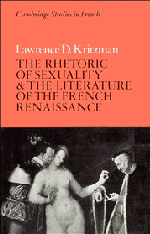Book contents
- Frontmatter
- Contents
- List of abbreviations
- Dedication
- Acknowledgments
- Introduction
- PART I RHETORICS OF GENDER
- 1 Pernette du Guillet and a voice of one's own
- 2 Rabelais and the representation of male subjectivity: the Rondibilis episode as case study
- 3 Verba erotica: Marguerite de Navarre and the rhetoric of silence
- 4 Pedagogical graffiti and the rhetoric of conceit
- 5 Montaigne's family romance
- PART II FIGURES OF THE BODY
- A DISFIGURING THE FEMININE
- B THE TEXT AS BODY
- PART III ALLEGORIES OF REPRESSION
- Notes
- Bibliography of works cited
- Index of names
- Subject index
- Cambridge Studies in French
4 - Pedagogical graffiti and the rhetoric of conceit
from PART I - RHETORICS OF GENDER
Published online by Cambridge University Press: 04 August 2010
- Frontmatter
- Contents
- List of abbreviations
- Dedication
- Acknowledgments
- Introduction
- PART I RHETORICS OF GENDER
- 1 Pernette du Guillet and a voice of one's own
- 2 Rabelais and the representation of male subjectivity: the Rondibilis episode as case study
- 3 Verba erotica: Marguerite de Navarre and the rhetoric of silence
- 4 Pedagogical graffiti and the rhetoric of conceit
- 5 Montaigne's family romance
- PART II FIGURES OF THE BODY
- A DISFIGURING THE FEMININE
- B THE TEXT AS BODY
- PART III ALLEGORIES OF REPRESSION
- Notes
- Bibliography of works cited
- Index of names
- Subject index
- Cambridge Studies in French
Summary
Co-naître, pour tout, c'est naître. Toute connaissance est une naissance.
Paul Claudel, Art poétique (1915)Most, if not all, of Montaigne's critics of the essay “De l'institution des enfans” read that text quite literally as a statement of the essayist's pedagogical imperative. Undoubtedly Montaigne sets out to define an idealized education that challenges the exigencies of medieval scholasticism in the name of a pedagogy aiming at the formation of judgment and wisdom. But on another level Montaigne's text problematizes the figural birth of the ego. “Je ne vise icy qu'à découvrir moy-mesmes.” The allegorical instruction underlying Montaigne's essay demonstrates that his pedagogical theory transcends its exemplary status; it is a rhetoric that projects the desire of an ego struggling to establish its sense of mastery. Montaigne's pedagogical graffiti engender a rhetoric of conceit, a term which I use both in its etymological and secondary significations: conceptualization, taking hold of, and vanity. Indeed, the crucial epistemological challenge of how to know what we know includes within it a speculative response that portrays the writing process as a linguistic apprenticeship unveiling latent configurations of narcissism.
Montaigne's text transcribes unconscious fantasies through figures of the self within the rhetoric of the essay; like the text of the dream, the text of the essay is “articulated through secondary elaboration,” an activity that displaces “the scriptural process of representation to the representation of the scriptural process.”
- Type
- Chapter
- Information
- Publisher: Cambridge University PressPrint publication year: 1991



